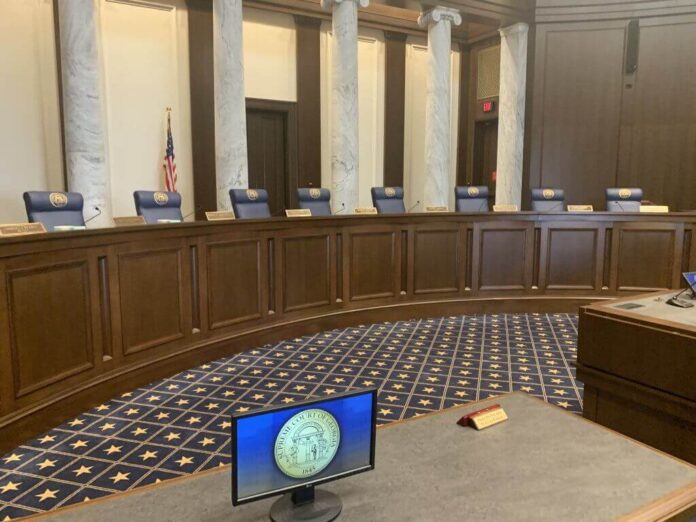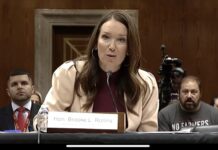
(Georgia Recorder) — The Georgia Supreme Court Tuesday afternoon declined the Republican National Committee’s request to pause a trial court’s decision to block new Georgia State Election Board rules from taking effect for the Nov. 5 general election.
The state Supreme Court issued the order rejecting the emergency motion filed by the Georgia Republican Party and Republican National Committee requesting that the court fast-track the reinstatement of several State Election Board requirements that were ruled to be illegal and unconstitutional by a lower court judge last week.
Fulton County Superior Court Judge Thomas A. Cox Jr. issued a ruling last week invalidating new statewide procedures for hand counting paper ballots, poll watcher access, and other election rules that were pushed through by three right-wing state election officials.
The Republican National Committee filed an emergency appeal directly with the Georgia Supreme Court last week to expedite the appellate process in order to have the rules enforced for the Nov. 5 election. Typically, the Georgia Court of Appeals is a necessary interim step before superior court rulings are considered by the state’s high court.
In the weeks following the November election, the Georgia Supreme Court is set to hold hearings on the RNC’s appeal before deciding on whether the new election procedures will be in place in future elections.
Attorneys for the state and the Republican groups argued for the pressing need to have rules in place for daily reporting on absentee ballots, new ID requirements for dropping off absentee ballots, hand counting paper ballots, and broader discretion for local election boards to investigate the way a county conducts an election before certification.
Voters in Georgia have continued to turn out in record numbers during the second week of early voting. Georgia is considered one of seven swing states this election, and polls continue to show a tight race here between Democratic Vice President Kamala Harris and former Republican President Donald Trump.
“If this appeal proceeds in the ordinary course, this appeal will not be fully briefed (let alone decided) until long after Election Day,” the State of Georgia’s emergency motion reads. “Relief after an ordinary-course disposition is a little relief at all: the November 2024 election (and subsequent ballot-counting and certification) would have been conducted in the absence of lawful procedures that justify greater public confidence in the outcome of the election. That confidence cannot be regained by ruling that promulgated rules were lawful but can be imposed only for the next election.”
Cox declared several new state election rules to be inconsistent with the current Georgia election code, including a mandate for ballot hand counting that conflicted with multiple provisions defining polling officials’ duties. Under the new state election rule, after polls close on election nights, three poll workers at every precinct would individually count paper ballots to confirm whether the hand tally matches the number of machine-counted ballots.
The State Election Board is also seeking reinstatement of a highly controversial change, giving the county election board’s new discretion over certifying election results. The three Republican state election officials are asking the court to clarify state law in order to give local election board officials the ability to examine election records and the right to cite any vote discrepancies or other election irregularities as a reason to refuse to certify the election results.
The State Election Board has been forced to defend against a flurry of lawsuits since former GOP state Sen. Rick Jeffares and political media personality Janelle King were appointed earlier this year to the five-member board. The controversial rules were often approved by a 3-2 majority, with Fulton County Republican Janice Johnston joining Sandy Spring’s King and Henry County’s Jeffares in advancing the proposed changes until the rules were finalized several weeks later.
Cox’s ruling last week resulted from a lawsuit filed by Eternal Vigilance Action, an election advocacy nonprofit founded in 2021 by Republican former state Rep. Scot Turner, which argues that the State Election Board’s recent rulemaking contradicts Georgia law regarding government separation of powers.
Turner, executive director of Eternal Vigilance, applauded the Supreme Court denying the emergency appeal Tuesday, which effectively ended the possibility of the contested rules going into effect this year. He stressed the plaintiffs’ resolve to continue the legal battle as the case moves forward.
“The quick decision by a Fulton County judge followed closely by a unanimous vote of the state Supreme Court should erase any doubt about the merits of our arguments,” Turner said in a statement Tuesday.
“I’m a Republican and this is a conservative policy organization. I do not like fighting my friends, but in this instance, fealty to the Georgia Constitution demands it. True conservatives oppose empowering an administrative state that’s not directly accountable to voters. This is another win for principle that only the people’s elected constitutional officers have the power to make law.”
Supporters of the State Election Board’s recently revised rules have defended them as necessary to ensure more accurate and fair elections across the state.
The state association of Georgia’s local election officials expressed concern that implementing last-minute rules like hand counting paper ballots could result in chaos at the polls and among election workers.
The three right-wing Georgia election board officials have faced intense criticism from state and national Democratic parties, bipartisan democracy advocates, and several civil rights groups.
“With this ruling, the Court keeps the status quo in place, refusing to allow the SEB to inject chaos and confusion into our democratic system,” Andrea Young, executive director of the American Civil Liberties Union of Georgia, said in a statement Tuesday.”We are excited about the record early-voting numbers in Georgia and glad that now all can focus on participating in this important election without disruption.”







